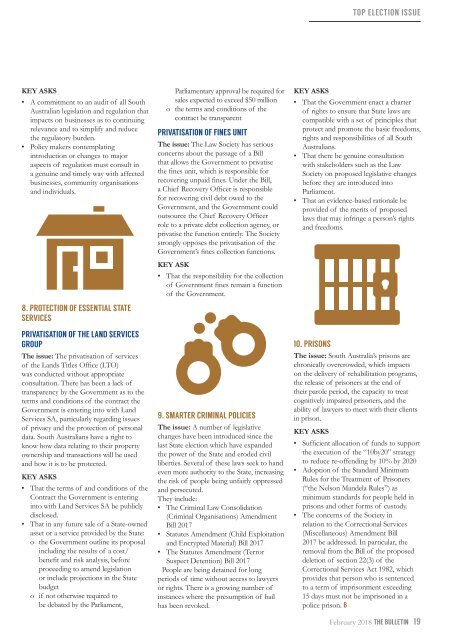LSB February 2018_Web_LSSA
Create successful ePaper yourself
Turn your PDF publications into a flip-book with our unique Google optimized e-Paper software.
TOP ELECTION ISSUE<br />
KEY ASKS<br />
• A commitment to an audit of all South<br />
Australian legislation and regulation that<br />
impacts on businesses as to continuing<br />
relevance and to simplify and reduce<br />
the regulatory burden.<br />
• Policy makers contemplating<br />
introduction or changes to major<br />
aspects of regulation must consult in<br />
a genuine and timely way with affected<br />
businesses, community organisations<br />
and individuals.<br />
8. PROTECTION OF ESSENTIAL STATE<br />
SERVICES<br />
PRIVATISATION OF THE LAND SERVICES<br />
GROUP<br />
The issue: The privatisation of services<br />
of the Lands Titles Office (LTO)<br />
was conducted without appropriate<br />
consultation. There has been a lack of<br />
transparency by the Government as to the<br />
terms and conditions of the contract the<br />
Government is entering into with Land<br />
Services SA, particularly regarding issues<br />
of privacy and the protection of personal<br />
data. South Australians have a right to<br />
know how data relating to their property<br />
ownership and transactions will be used<br />
and how it is to be protected.<br />
KEY ASKS<br />
• That the terms of and conditions of the<br />
Contract the Government is entering<br />
into with Land Services SA be publicly<br />
disclosed.<br />
• That in any future sale of a State-owned<br />
asset or a service provided by the State:<br />
o the Government outline its proposal<br />
including the results of a cost/<br />
benefit and risk analysis, before<br />
proceeding to amend legislation<br />
or include projections in the State<br />
budget<br />
o if not otherwise required to<br />
be debated by the Parliament,<br />
Parliamentary approval be required for<br />
sales expected to exceed $50 million<br />
o the terms and conditions of the<br />
contract be transparent<br />
PRIVATISATION OF FINES UNIT<br />
The issue: The Law Society has serious<br />
concerns about the passage of a Bill<br />
that allows the Government to privatise<br />
the fines unit, which is responsible for<br />
recovering unpaid fines. Under the Bill,<br />
a Chief Recovery Officer is responsible<br />
for recovering civil debt owed to the<br />
Government, and the Government could<br />
outsource the Chief Recovery Officer<br />
role to a private debt collection agency, or<br />
privatise the function entirely. The Society<br />
strongly opposes the privatisation of the<br />
Government’s fines collection functions.<br />
KEY ASK<br />
• That the responsibility for the collection<br />
of Government fines remain a function<br />
of the Government.<br />
9. SMARTER CRIMINAL POLICIES<br />
The issue: A number of legislative<br />
changes have been introduced since the<br />
last State election which have expanded<br />
the power of the State and eroded civil<br />
liberties. Several of these laws seek to hand<br />
even more authority to the State, increasing<br />
the risk of people being unfairly oppressed<br />
and persecuted.<br />
They include:<br />
• The Criminal Law Consolidation<br />
(Criminal Organisations) Amendment<br />
Bill 2017<br />
• Statutes Amendment (Child Exploitation<br />
and Encrypted Material) Bill 2017<br />
• The Statutes Amendment (Terror<br />
Suspect Detention) Bill 2017<br />
People are being detained for long<br />
periods of time without access to lawyers<br />
or rights. There is a growing number of<br />
instances where the presumption of bail<br />
has been revoked.<br />
KEY ASKS<br />
• That the Government enact a charter<br />
of rights to ensure that State laws are<br />
compatible with a set of principles that<br />
protect and promote the basic freedoms,<br />
rights and responsibilities of all South<br />
Australians.<br />
• That there be genuine consultation<br />
with stakeholders such as the Law<br />
Society on proposed legislative changes<br />
before they are introduced into<br />
Parliament.<br />
• That an evidence-based rationale be<br />
provided of the merits of proposed<br />
laws that may infringe a person’s rights<br />
and freedoms.<br />
10. PRISONS<br />
The issue: South Australia’s prisons are<br />
chronically overcrowded, which impacts<br />
on the delivery of rehabilitation programs,<br />
the release of prisoners at the end of<br />
their parole period, the capacity to treat<br />
cognitively impaired prisoners, and the<br />
ability of lawyers to meet with their clients<br />
in prison.<br />
KEY ASKS<br />
• Sufficient allocation of funds to support<br />
the execution of the “10by20” strategy<br />
to reduce re-offending by 10% by 2020<br />
• Adoption of the Standard Minimum<br />
Rules for the Treatment of Prisoners<br />
(“the Nelson Mandela Rules”) as<br />
minimum standards for people held in<br />
prisons and other forms of custody.<br />
• The concerns of the Society in<br />
relation to the Correctional Services<br />
(Miscellaneous) Amendment Bill<br />
2017 be addressed. In particular, the<br />
removal from the Bill of the proposed<br />
deletion of section 22(3) of the<br />
Correctional Services Act 1982, which<br />
provides that person who is sentenced<br />
to a term of imprisonment exceeding<br />
15 days must not be imprisoned in a<br />
police prison. B<br />
<strong>February</strong> <strong>2018</strong> THE BULLETIN 19


















